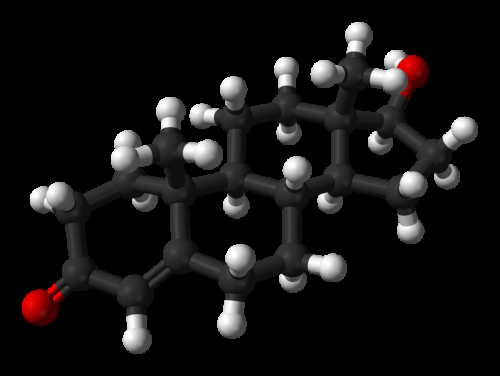Ball-and-stick model of the testosterone molecule, C19H28O2, as found in the crystal structure of testosterone monohydrate. Credit: Ben Mills/Wikipedia
A team of researchers from Shenzhen University, Wayne State University and Peking University, has found via experimentation that young males given a dose of testosterone are more generous when they are watched by others. In their paper published in the journal Proceedings of the Royal Society B, the group outlines an experiment they conducted with young male volunteers and what they learned from it.
Prior research has shown that the "audience effect" tends to make people more generous with donations—when asked to give when in the presence of others, most people tend to give more. In this new effort, the researchers wondered about possible impacts on giving when a young man also has heightened levels of testosterone in his body—the hormone has previously been linked to status-seeking behavior by men.
The experiment involved rubbing a testosterone gel on the upper arms and shoulders of 140 male volunteers between the ages of 18 and 25. Unbeknownst to the volunteers, half of them had been treated with a gel containing testosterone, while the other half got a placebo.
They then waited for three hours for the testosterone to make its way into their bodies. They were then asked to donate money to a well-known charity. Some of the volunteers were asked to donate in a private setting, while some were asked to donate while standing in front of a group of onlookers.
In studying their data, the researchers found that those men who had received the gel with testosterone and who were asked to donate while others watched tended to donate the most money to the charity.
The researchers suggest that the volunteers were showing an example of a desire to appear more attractive or to enhance their status—all due to the increased amount of the hormone, which was having an impact on their brains. It had given them an increased desire to boost their social standing—and they gave in to that desire by donating more money.
More information: Yin Wu et al. Exogenous testosterone increases the audience effect in healthy males: evidence for the social status hypothesis, Proceedings of the Royal Society B: Biological Sciences (2020). DOI: 10.1098/rspb.2020.0976
Journal information: Proceedings of the Royal Society B
© 2020 Science X Network






















